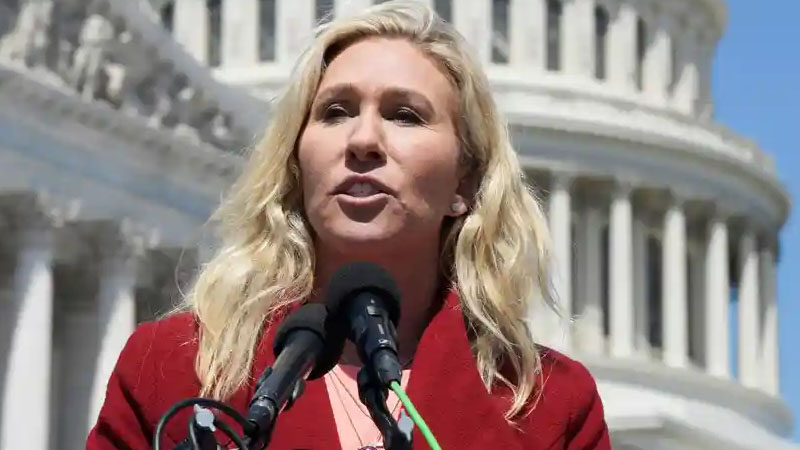How Marjorie Taylor Greene’s Leadership Challenge Could Unintentionally Strengthen Bipartisan Cooperation

Photograph: Lenin Nolly/SOPA Images/REX/Shutterstock
Representative Marjorie Taylor Greene, a Republican from Georgia, finds herself in a precarious position that could unintentionally compel House Speaker Mike Johnson, a Republican from Louisiana, to take actions contrary to her wishes by challenging his leadership.
Greene’s bold move last week, when she introduced a motion to vacate, has set the stage for a potential showdown in the House. While she has yet to schedule a vote on the motion, the dynamics within the House could shift significantly in her favor once the Republican majority decreases next month due to impending resignations.
This change could potentially allow Greene to secure Johnson’s ouster with just a single GOP vote, provided the Democrats do not intervene to preserve Johnson’s position, as outlined in a report by Politico.
“You should take her very seriously,” said Rep. Tim Burchett (R-TN), who helped oust Kevin McCarthy as speaker but isn’t ready to push out Johnson. “Marjorie is playing chess, not checkers. She’s looking at the long game, and she’s holding all the cards on this one, and I think it’s an attempt on her part to move the Republican party to a more conservative area — where our base is.”
The situation is laden with irony as Greene’s maneuver might lead to unintended consequences that align with Democratic interests rather than those of her own party. Johnson, facing the threat from Greene, could be driven to collaborate with Democrats to ensure the passage of a $1.2 trillion spending bill, which is largely opposed by the Republican faction. Additionally, Johnson might offer Democrats the opportunity to advocate for Ukraine aid on the House floor, using it as a bargaining chip to garner support from across the aisle and secure his leadership role.
The reaction within the Republican ranks to Greene’s aggressive stance against Johnson has been one of skepticism and resistance. Many Republicans are currently distancing themselves from Greene’s tactics, questioning her motives and the potential implications of her actions. The general sentiment among her peers suggests a reluctance to support her bid against Johnson, at least in the current political climate.
“Wouldn’t that be rich,” said one House Republican, who summed up the GOP fear that Johnson would have no choice but to seek help from Democrats in return for Ukraine aid.
This complex interplay of political strategies and alliances underscores the fragile nature of leadership within the House and the intricate balance of power among its members. Greene’s challenge to Johnson not only highlights the internal divisions within the Republican Party but also underscores the potential for cross-party negotiations and alignments in the face of leadership disputes.
As the situation unfolds, the political landscape within the House remains volatile, with the potential for significant shifts in alliances and strategies that could redefine the direction of legislative action and leadership dynamics.
“She’s on the McCarthy revenge tour,” said House Freedom Caucus Chair Bob Good (R-VA), one of eight GOP lawmakers who voted to remove McCarthy. “We don’t talk about removing the speaker. We’re trying to influence him to do the right thing.”


